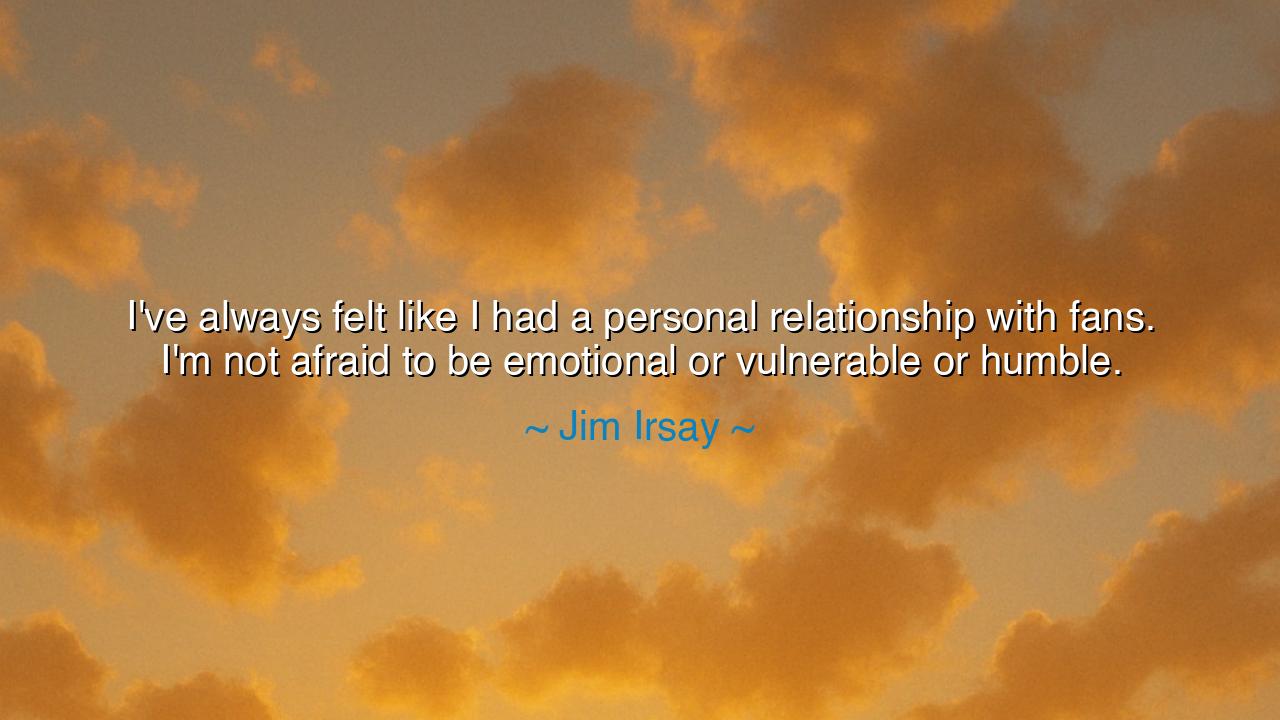
I've always felt like I had a personal relationship with fans.
I've always felt like I had a personal relationship with fans. I'm not afraid to be emotional or vulnerable or humble.






The steward of sport, Jim Irsay, once declared with heartfelt candor: “I’ve always felt like I had a personal relationship with fans. I’m not afraid to be emotional or vulnerable or humble.” In these words he reveals the sacred bond between leader and people, a relationship not built on power or distance, but on shared humanity. He reminds us that greatness is not found in aloofness, but in the courage to show one’s heart.
For the fans are more than spectators; they are the lifeblood of the game, the multitude whose passion gives meaning to the contest. To see them not as faceless masses, but as companions in a common story, is to honor them rightly. By claiming a personal relationship, Irsay dissolves the wall between owner and supporter, declaring that he, too, is part of the family that celebrates and suffers with the team.
This bond requires emotion, for without feeling there can be no true connection. It requires vulnerability, for only by showing weakness and honesty can trust be born. And it requires humility, for the one in high position must stoop to walk among those who follow, knowing that power without compassion is hollow. In this trinity—emotion, vulnerability, humility—lies the foundation of genuine loyalty.
The ancients also praised such qualities. Kings who exalted themselves above their people fell swiftly, but those who wept with their subjects and carried their burdens endured in memory. The philosopher taught that the strongest leader is not the one feared, but the one loved, for love binds more tightly than chains. Thus, Irsay’s words echo this timeless truth: the strength of leadership is measured in humanity, not in distance.
So let this wisdom endure: if you would lead, whether in sport, in art, or in life, build a relationship with those who walk beside you. Do not fear to be emotional, to be vulnerable, to be humble. For in such honesty lies the power to unite hearts, to inspire loyalty, and to leave behind not only victories, but a legacy of connection that time itself cannot erase.






APAnh Pham
Irsay’s statement about being humble and vulnerable with his fans is a reminder of how important it is to connect on a human level. But it makes me wonder, is vulnerability something everyone can handle? Can being emotionally open sometimes create a sense of discomfort or even alienation in others, especially when the boundaries between personal and professional lives are so blurred? How do we navigate the fine line between honesty and self-protection?
HYLu Nhat Hai Yen
Jim Irsay’s perspective on having a personal relationship with fans makes me think about the power of emotional connection in public life. It’s rare to see someone not afraid to show vulnerability, especially in such a high-profile position. But does this openness make fans more empathetic toward him, or can it backfire? How does society perceive emotional vulnerability from public figures—is it seen as a strength or a weakness?
GBNguyen Gia Bao
I find Jim Irsay’s approach to connecting with fans really admirable. Being vulnerable and humble can create a deeper connection with others, but I wonder how difficult it must be for someone in the public eye to maintain that level of openness. Is there a point where being too emotionally available might hurt the public persona or lead to overexposure? How do you balance authenticity with the need for privacy?
-H-Halia Hawara
Jim Irsay’s quote really speaks to the importance of emotional authenticity. In a world where many public figures maintain a facade of perfection, it’s refreshing to hear someone embrace vulnerability and humility. But how often do we see that in reality? Can being emotionally open with fans enhance the relationship, or do boundaries sometimes get blurred between personal and public lives? Is there a risk in letting down your guard too much?